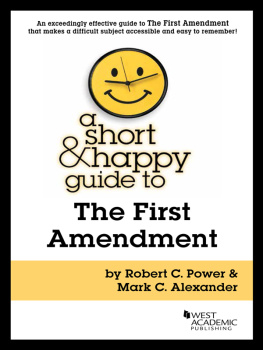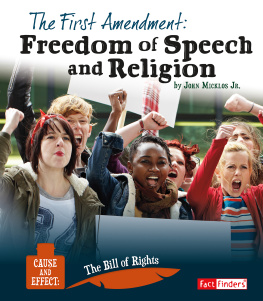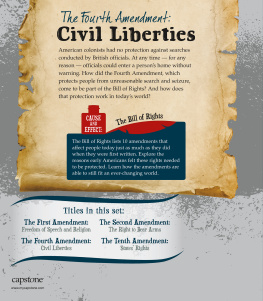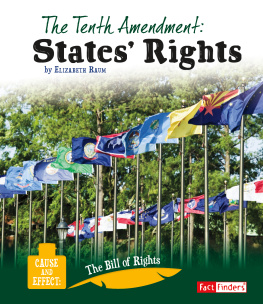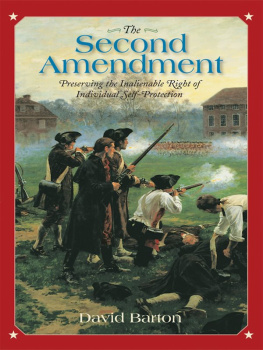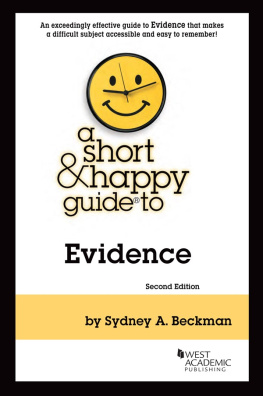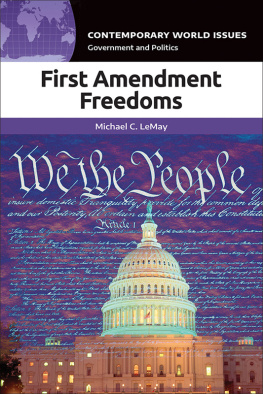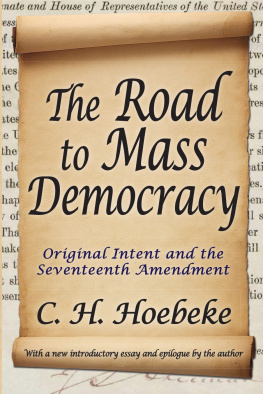Robert Power - A Short and Happy Guide to the First Amendment
Here you can read online Robert Power - A Short and Happy Guide to the First Amendment full text of the book (entire story) in english for free. Download pdf and epub, get meaning, cover and reviews about this ebook. year: 2016, publisher: West Academic, genre: Romance novel. Description of the work, (preface) as well as reviews are available. Best literature library LitArk.com created for fans of good reading and offers a wide selection of genres:
Romance novel
Science fiction
Adventure
Detective
Science
History
Home and family
Prose
Art
Politics
Computer
Non-fiction
Religion
Business
Children
Humor
Choose a favorite category and find really read worthwhile books. Enjoy immersion in the world of imagination, feel the emotions of the characters or learn something new for yourself, make an fascinating discovery.
- Book:A Short and Happy Guide to the First Amendment
- Author:
- Publisher:West Academic
- Genre:
- Year:2016
- Rating:3 / 5
- Favourites:Add to favourites
- Your mark:
- 60
- 1
- 2
- 3
- 4
- 5
A Short and Happy Guide to the First Amendment: summary, description and annotation
We offer to read an annotation, description, summary or preface (depends on what the author of the book "A Short and Happy Guide to the First Amendment" wrote himself). If you haven't found the necessary information about the book — write in the comments, we will try to find it.
This concise guide breaks down a complicated topicthe First Amendmentand makes it understandable and fun. The book walks briskly through cases, rules, and theories to draw a reader-friendly road map of the First Amendment.
A Short and Happy Guide to the First Amendment — read online for free the complete book (whole text) full work
Below is the text of the book, divided by pages. System saving the place of the last page read, allows you to conveniently read the book "A Short and Happy Guide to the First Amendment" online for free, without having to search again every time where you left off. Put a bookmark, and you can go to the page where you finished reading at any time.
Font size:
Interval:
Bookmark:

Law School Advisory Board
_____________
JESSE H. CHOPER
Professor of Law and Dean Emeritus,
University of California, Berkeley
JOSHUA DRESSLER
Distinguished University Professor, Frank R. Strong Chair in Law
Michael E. Moritz College of Law, The Ohio State University
YALE KAMISAR
Professor of Law Emeritus, University of San Diego
Professor of Law Emeritus, University of Michigan
MARY KAY KANE
Professor of Law, Chancellor and Dean Emeritus,
University of California, Hastings College of the Law
LARRY D. KRAMER
President, William and Flora Hewlett Foundation
JONATHAN R. MACEY
Professor of Law, Yale Law School
ARTHUR R. MILLER
University Professor, New York University
Formerly Bruce Bromley Professor of Law, Harvard University
GRANT S. NELSON
Professor of Law, Pepperdine University
Professor of Law Emeritus, University of California, Los Angeles
A. BENJAMIN SPENCER
Earle K. Shawe Professor of Law,
University of Virginia School of Law
JAMES J. WHITE
Robert A. Sullivan Professor of Law Emeritus,
University of Michigan

a short & happy guide to
The First Amendment
Robert C. Power
Associate Dean for Academic Affairs,
Distinguished Professor of Law
Widener University Commonwealth Law School
Mark C. Alexander
Professor of Law and Associate Dean for Academics
Seton Hall University School of Law
A SHORT & HAPPY GUIDE SERIES

The publisher is not engaged in rendering legal or other professional advice, and this publication is not a substitute for the advice of an attorney. If you require legal or other expert advice, you should seek the services of a competent attorney or other professional.
a short & happy guide series is a trademark registered in the U.S. Patent and Trademark Office.
2016 LEG, Inc. d/b/a West Academic
444 Cedar Street, Suite 700
St. Paul, MN 55101
1-877-888-1330
Printed in the United States of America
ISBN: 978-1-63460-258-7
Bob thanks Charles and Jane Power, sorry that this is later rather than sooner. He thanks Paula Heider and Jeremy Wingert for their excellent help telling him what to do. He also wishes to acknowledge the work of various research assistants over the years, and specifically thanks Harrison Carruthers and Amanda Tarpitt as class representatives.
Mark thanks Tracy Alexander for encouraging and inspiring him to do this book. Many thanks to his beloved family; too many to single out any one, but deeply grateful for all. He is also grateful for support and assistance from Seton Hall University School of Law, its students, faculty and staff.
Both of us thank the excellent production staff at West Academic. You were superb to work with.
A Short & Happy Guide to the First Amendment

The First Amendment is in many ways a defining feature of our government. Coming after the Constitution itself creates the structure of government, the Amendments in large part spell out individual rights. The First Amendment protects the freedom of religion, speech and press, and the right to assemble and petition the Government. It transforms the Great Document from simply being about the government, to being about the people and their freedoms.
The problems we encounter in talking about the First Amendment are always interesting. They typically present situations with which we can easily identify, whether an individuals attempt to protest government policy, to ones desire to worship without interference, to what we see on television and online. The specific cases arelike Law & Order ripped from the headlines, as we talk about flag-burning, curse words, pornography, Ten Commandments displays, prayer in schools, campaign finance, and more. The specific problems are always interesting and challenging, like a good puzzle.
Interestingly, it all starts with the words Congress shall make no law, thus apparently applying an absolute ban on the federal government regulating these areas. Instead, we will see that the First Amendment has been interpreted broadly to apply to all governments, federal, state and local. And what may at first appear to be an absolute ban has been interpreted to allow very significant restrictions on speech, religion and the press.
We want to start with a broad philosophical discussion of what the First Amendment is about, to set up all that follows throughout these pages. In this book, we focus most heavily on speech and religion. Starting with speech, there are several broad, important themes that will be important for you to understand as we move forward. The basic question is Why do we provide for a protection of speech in this country? There are several possible answers, none of which is exclusive, and each of which is complementary to the others.
First, we might consider the First Amendment to be essential to the pursuit of truth in a marketplace of ideas. The government is not allowed to interfere with this market, so as to let good ideas rise and fall on their merits. So, for example, if I want to argue that the earth is flat, then I can. I believe it to be true. I am convinced. I approach you and tell you that if you look out from where you are standing, across the horizon, you can see that the earth comes to an end, and its a flat line out there. Think about it. It looks kinda flat to the naked eye. It ends, and when you get to the end, thats it. Flat. So you say that you are starting to believe me. Your search for the truth about our land is that it is flat. But then another friend comes up to you and says that you shouldnt listen to me. The earth is ROUND, she says! Amazing concept. How does she know? She has been on an airplane and could tell that theres something not quite flat from way up high. So you ask her, if shes sure, does she have any pictures. She says no, but shes pretty sure. Youre not convinced yet. The debate is going on in your head. Finally an old man comes up to you and tells you he is from Montclair, New Jersey. Buzz Aldrin is his name. He has been up to the moon in a space ship, and guess what he saw? The earth, round, like a big blue marble in space. And hes got pictures to prove it. So now, you change your mind, and you believe the earth is round. By allowing all of us to speak, uninhibited, the marketplace of ideas sorted out this little debate, and you found what you believe to be truethat the earth is in fact round. The First Amendment ensures that we can always have such debates.
Another way to look at the importance of the First Amendment is to view it as central to our nations commitment to self-governance through robust public debate. We as a people are committed to a system of government by which we are all allowed (and maybe even expected) to participate in governance. We threw away the mantle of monarchy in exchange for a government of the people, a democracy. In that context, it is essential for us all to participate, and for our participation not to be regulated by the government. Every day we are allowed to debate the policies of the governmentgood, bad or indifferent. President Obama wakes up each morning and looks out the window and can see someone out front on 1600 Pennsylvania Avenue with a sign that says Impeach Obama or Obama Sucks , or something like that. Before him, George W. Bush got to see protestors with the same message of ousting him from office, as did Bill Clinton before him, and so on and so on. The First Amendment protects that right, and prohibits the president or any government official from getting in the way of our self-governance.
Font size:
Interval:
Bookmark:
Similar books «A Short and Happy Guide to the First Amendment»
Look at similar books to A Short and Happy Guide to the First Amendment. We have selected literature similar in name and meaning in the hope of providing readers with more options to find new, interesting, not yet read works.
Discussion, reviews of the book A Short and Happy Guide to the First Amendment and just readers' own opinions. Leave your comments, write what you think about the work, its meaning or the main characters. Specify what exactly you liked and what you didn't like, and why you think so.

